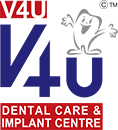ORAL SURGERY
Get in touch with us today!
Oral surgery is a branch of dentistry which deals with the complex structures of head, neck and face. A specialist in this branch can treat the mouth as well as the jaws and face. This dentist performs dentoalveolar surgeries like removal of impacted teeth, extraction of multiple teeth in medically compromised patients.
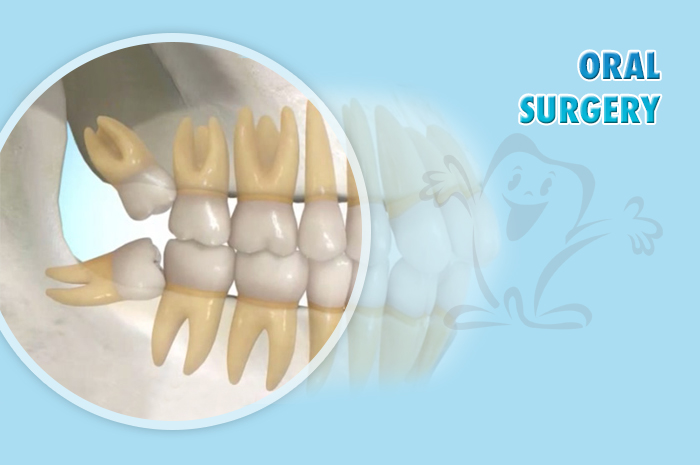
Cosmetic surgeries of head and neck as well as corrective surgeries for disorders like sleep apnoea, malaligned and protruded jaws or surgeries durby these specialists. Their services are also called for during diagnosis and treatment of any benign or malignant tumors of head, neck and face. They are experts in treating disorders of temperomandibular joints, correcting fractures of jaws, face, nose, eyes and skull. They also treat chronic facial pain like trigeminal neuralgia as well as corrective measures for treating congenital deformities like clefts are also performed under their wings. Thus this branch is the bridge between medical field and dentistry.
A) Third molar extractions
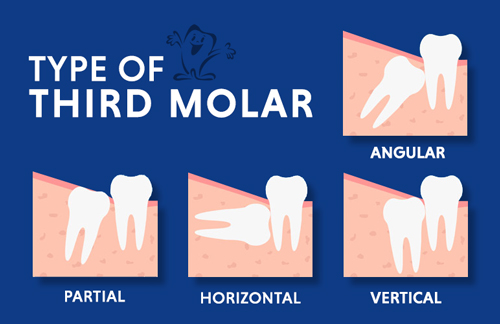
Third molar is fondly called the wisdom tooth or the last tooth to erupt in the oral cavity. There are 4 wisdom teeth; two on top and two below. Generally this tooth erupts around the age of 25-30 years. Thus most of the people do not have sufficient space for this tooth to erupt in the oral cavity hence it partially erupts or is unable to appear in the mouth at all. At this time the patient suffers from pain which radiates to the whole side of the face.

When the tooth is partially erupted in oral cavity it is called “impacted tooth”. The area cannot be cleaned properly and causes inflammation of surrounding gums leading to bleeding from gums. There can be swelling present in relation to the tooth in question. The pain can radiate to the whole jaw where the patient cannot localize the pain and can reach till the head, cheeks and ear also. Mouth opening can get restricted. Some patients also suffer from fever. Pus exudates can also be present.
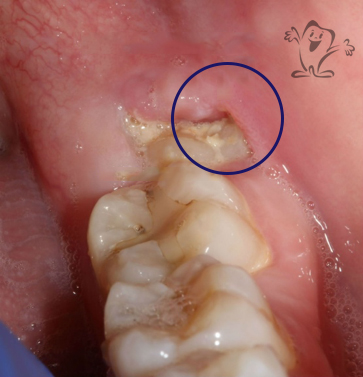
If the tooth is partially erupted then some part of gum is still present on the tooth. This area becomes a niche for accumulation of food particles and debris. As it cannot be cleaned properly the region becomes swollen and red. This condition is called “pericoronitis”. Symptomatic treatment like using mouthwashes, irrigation or use of antibiotics can resolve this condition. Generally warm water with salt does the trick to resolve the infection. It should be carried out 3-4 times a day. In case the inflammation does not resolve then the tooth should be shown to a dentist. Our team is capable of diagnosing this problem and our experienced oral surgeon will be able to relieve you of this pain in no time by extracting the culprit tooth.
Incase of recurrent pain in the region of third molar the dentists in our clinic would take an X-ray to see the position of the tooth. If the tooth can erupt completely in the mouth then palliative treatment would be provided by our specialists. Sometimes a small cut is placed on the gums to aid the tooth to erupt in the mouth.
If it becomes sure that the tooth cannot erupt completely in the mouth after seeing the X-ray then the tooth is deemed for extraction. In the following conditions the third molar is extracted: if the tooth is partially present in the mouth and it is decayed as caries can occur very commonly in this tooth due to its placement at the end of the mouth and compromised oral hygiene. Also if the tooth is causing severe pain and discomfort followed by recurrent swelling then the tooth is extracted.
Sometimes the tooth cannot erupt in the mouth at all but it causes severe pain and mouth opening is reduced. This could be due to the position of the tooth where it could be lying horizontally in the bone, otherwise there is too much bone above the tooth and it cannot come out. In such cases after taking and X-ray the tooth is removed. Such teeth have to be cut into two parts and removed. Sutures are placed to close the area.
The patient is informed that there could be swelling in the region of tooth based on the severity of impaction. Slight swelling for few days is common and it reduces in 3-4 days. For the first day saliva and blood have to be swallowed. No intake of hot, spicy, hard or oily food for 2 days. Mild painkillers like paracetamol have to be taken in case of pain. Mouthwash can be used from 2nd day. Brushing can be started after 3-4 days in that region. If swelling is present then hot fermentation is to be applied from 2nd day. On the day of surgery cold pack is placed in the region. The patient is instructed to come after 8-10 days for suture removal.
B) Treatment of trauma

Facial trauma due to any accident can be treated by oral surgeons. They can treat facial laceration, fractures of jaws, nose, cheek bones and eyes also. They are skilled in performing delicate surgeries in these regions. Our panel oral surgeon is available any time during such emergencies. We are just a call away!!
C) Removal of local lesions/ excisional biopsy
Incase of any overgrowth in the mouth due to trauma, cancer then an oral surgeon is the dentist who is approached for its removal. The surgeon will not only remove the lesion with ease and precision but also check the surrounding region for any pathology. Never take any unhealing ulcers slightly. Call us and take an appointment immediately for consultation. Early diagnosis is starting of the best treatment.
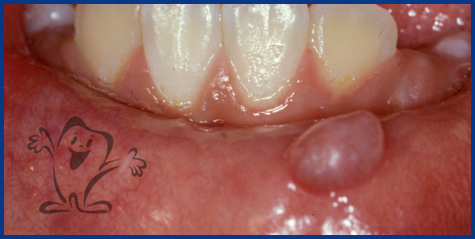
D) Orthognathic surgeries
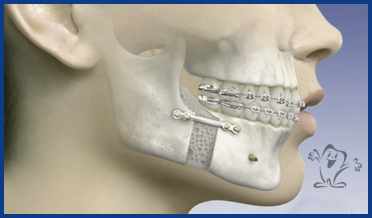
In cases where the patients are being treated for malaligned teeth sometimes there is excessive growth of the jaw which cannot be corrected by braces. In such cases the oral surgeons come to the rescue where they remove the excess jaw under general anaesthesia. Thus in such cases there is multidisciplinary approach where two speciality dentists work together.
E) Temperomandibular pathology
Some patients have problems in opening their mouths fully due to some defects from birth. X Such patients are treated by the oral surgeons where they release the joint near the ear called the temperomandibular joint so that they can open their mouth fully. This procedure is very technique sensitive and is performed under general anaesthesia only. Others have unbearable pain near the ear and stiffness of jaw muscles which hinders their daily routine. V4U Dental Care and Implant Centre have very skilled and expert oral surgeons who can treat such complicated cases with ease and bring back the facial beauty and self confidence of the patient.
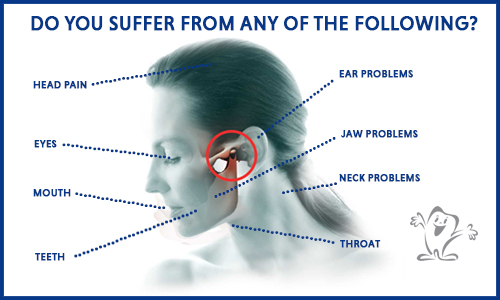
F) Treatment of cleft lips and palate
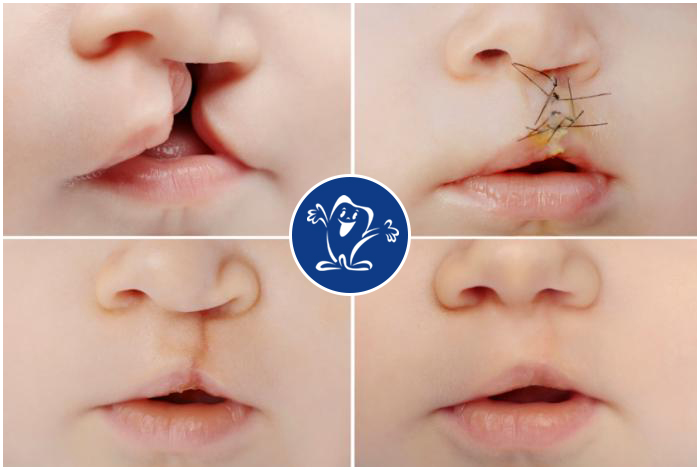
This is an acquired defect from birth which reduces the chances of survival of the child as there is a gap present between the mouth and nose. Thus, feeding such babies become very difficult. Generally it occurs in the upper lip and palate where both are not fully formed. Such babies are treated by oral surgeons where they close these gaps and reconstruct the structures missing. This procedure enables the babies to feed and drink properly increasing their chances of survival. Our oral surgeon is capable of performing such surgeries as well as can handle small children well. Leave your bundle of joy in our hands and see them transform completely making life easier for them as well as you.
